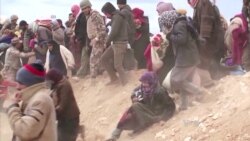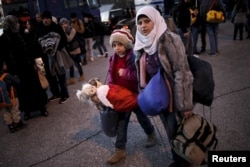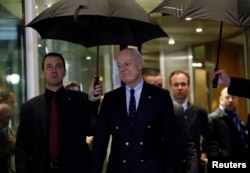U.S. Secretary of State John Kerry has pledged nearly $1 billion in new U.S. aid for Syrian refugees at an international donors conference and is calling for the Syrian government and Russia to halt attacks on rebel-held areas in order to let humanitarian aid through.
The conference opened Thursday in London with donor nations exceeding their goal of $9 billion. British Prime Minister David Cameron said pledges had surpassed $10 billion by the end of the day. Britain, along with Germany, Norway, Kuwait and the United Nations, are hosting the Syria Donors Conference, the fourth to be held.
Kerry called this a “critical engagement,” saying Syria’s political and humanitarian crisis is a “moral imperative.” He said the United States is providing an additional $601 million in assistance to the Syrian people, plus $290 million in development aid specifically for education to refugee children in Jordan and Lebanon.
The $10 billion figure is more than double the $4.5 pledged last year, reflecting the urgency the migrant crisis has caused among Western governments.
The amount pledged aims to support people in Syria as well as in Jordan, Lebanon and Turkey, neighbor countries that are strained by the exodus of refugees fleeing the fighting.
U.S. Assistant Secretary of State Anne Richard discussed the agenda ahead of the conference with VOA.
“This year there are more ambitious goals, which are to do more to educate children, to get jobs for the refugees, to bring development resources to bear, to help people get to safety not just in the region, but beyond as well.”
Prime Minister Cameron said there is a “critical shortfall” in life-saving aid that he said is holding back the international community’s humanitarian efforts. “If ever there was a moment to take a new approach to the humanitarian crisis in Syria, surely it is now,” he said.
WATCH: Related TV report by Henry Ridgwell:
Migrant crisis
That urgency is fueled by a migrant crisis that saw 1 million people, largely from Syria, move into western Europe in 2015. Projections are the numbers will swell to 4 million this year. Overwhelmed, some European countries have announced measures to reduce the number of asylum seekers and are now focusing on containing the flow of refugees.
“After years of conflict, we are witnessing a desperate movement of humanity as hundreds of thousands of Syrians fear they have no alternative to put their lives in the hands of evil people smugglers in search of a future," Cameron said.
Geneva peace talk suspended
The troubled peace process overshadowed the conference and lent more urgency to the need to address the conflict at its root.
The meeting got under way hours after fragile peace talks in Geneva were suspended amid protests by the opposition over the Syrian government's escalating Russian-backed offensive against rebels around the city of Aleppo, where a human rights monitoring group, the Syrian Observatory for Human Rights, said 40,000 people fled this week alone.
U.N. special envoy Staffan de Mistura issued a statement late Wednesday saying indirect talks would be temporarily paused until February 25, but could resume sooner.
The opposition is represented by the Saudi-backed High Negotiations Committee, which joined the talks only after U.S. and U.N. officials convinced them that their preliminary demands would be addressed.
The group has demanded an end to airstrikes on civilians by the government of Syrian President Bashar al-Assad and Russia, as well as a lifting of sieges that are blocking the flow of humanitarian aid to rebel-held areas. It also wants the government to release thousands of detainees.
In London Thursday, Kerry called on both the Syrian government and Russia to halt attacks on opposition-held areas to permit the delivery of humanitarian aid. The U.S. official said he looks forward to talks resuming later this month.
After meeting with British Foreign Secretary Philip Hammond on the sidelines of the donors conference, Kerry told reporters he held what he described as a robust discussion with Russian Foreign Minister Sergey Lavrov on the need to implement a cease-fire and allow for humanitarian shipments.
“It could not be more clear. That is an obligation that is not tied to talks. It is an obligation accepted by all parties in the United Nations resolution. Russia voted for that, Russia has a responsibility, as do all parties, to live up to it,” said Kerry.








